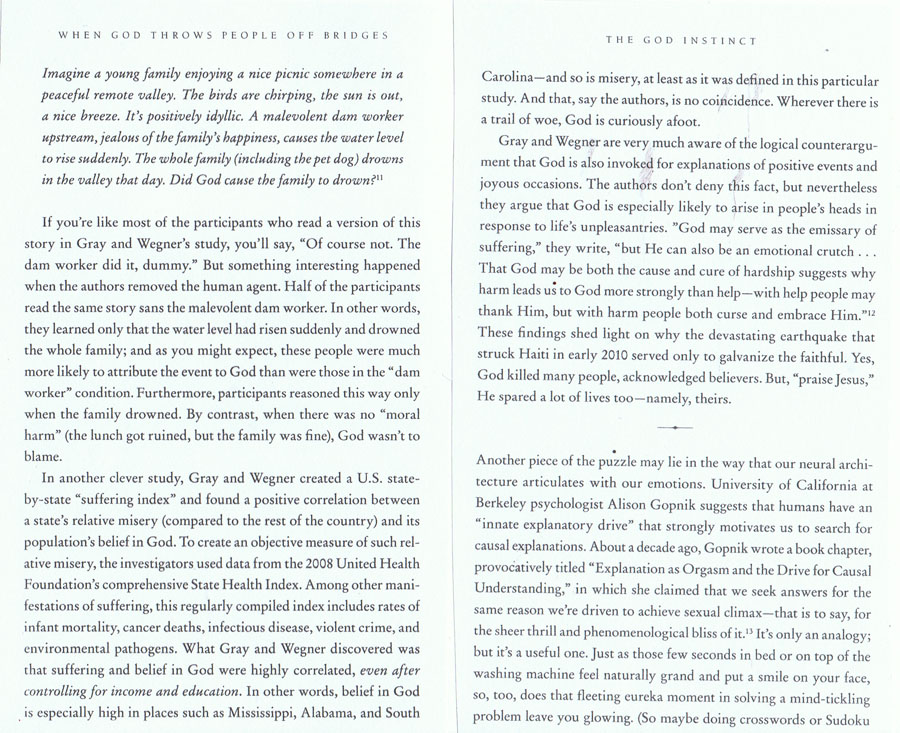The God Instinct
The Psychology of Souls, Destiny and the Meaning of LifeJesse Bering
The importance of language in general and gossip in particular. Now, even a single witness to some antisocial act could affect your reputation.
But no matter how good you are using language, you cannot perfectly communicate your innermost experiences to someone else.
More books on Mind
We always assume intentions in other's actions. We don't just process an action by someone else; we try to explain it to ourselves. We are 'natural psychologists'. In the prehistoric environment usually the most dangerous critters were other human beings. So premium on being able to second guess their intentions and actions.
And even very young babies have a cognitive bias to see intention in inanimate objects. Studies showing people film of circle, square, triangle 'interacting' - every view made up a story to explain actions in terms of intentional agents. So it seems that having a theory of mind was so useful to our ancestors in explaining and predicting behaviour of others that it has completely flooded social brains. And we do exactly the same with God - we treat him as just another mind, with emotions and intentions.
Creationist explanations sound common sense, whereas evolutionary explanations have to be thought through.
Most religions have human species as being here for some divine purpose, and each human individual exists for a special purpose. But big problem with that approach is - where do you stop? Is each mosquito here on the planet to serve a purpose as well? Each microscopic bacteria?
And religions are convinced that God is sending signs all the time - hurricanes and tsunamis etc. Each omen, sign or symbol is an attempt to apply the theory of mind - get inside God's head to figure out what he is trying to tell you. Even most agnostic is prey to this. When my mother died in early morning, my sister who was with her, saw a beam of moonlight come through the curtains and strike her wedding photo on the wall. She interpreted that as our dad coming to get her (and so everything was ok).
Paranoia is a theory of mind gone berserk. Individual sees a meaning in every event, and misattribute causation.
When survey christians on various hot-button issues they are certain that God also shares their opinion. Believe that God is on yr side on everything from stem cell research to prayer in schools to Iran's nuclear program. And when they occasionally change their mind because someone has produced persuasive counterarguments, they are then convinced that their revised stance was God's real attitude all along.
We are inherently dissatisfied with the amoral vicissitudes of life. Because we are a deeply social species, we have developed ways to punish any social infractions, as a way to hold group together. That works fine when the culprit is a person, but when there's no obvious human agent, we see the hand of God.

Our brains are rigged up to chase short bursts of pleasure - sexual orgasm the obvious one, but also finding a causal explanation for something. Not crucial whether right or wrong - just generating multiple possible answers increases the odds that some of the answers will be correct and help your repro chances.
'God of the gaps' theory that religious people just plug in 'God' as the answer whenever they come across something they don't understand. But need to also remember that we still invoke 'Act of God' even when causes understood. When a tree falls on someone we realize it was combination of high winds and rotten branch, but we still wonder why that person was underneath it when it fell. Even professed atheists often come up with statements like "everything happens for a reason" or "I was meant to go there because that was when I met my future husband."
Our intuitive "Where there's smoke there's fire" reasoning is 'commonsense', but the "innocent until proven guilty" counterpoint takes rational effort to realize.
Books by Title
Books by Author
Books by Topic